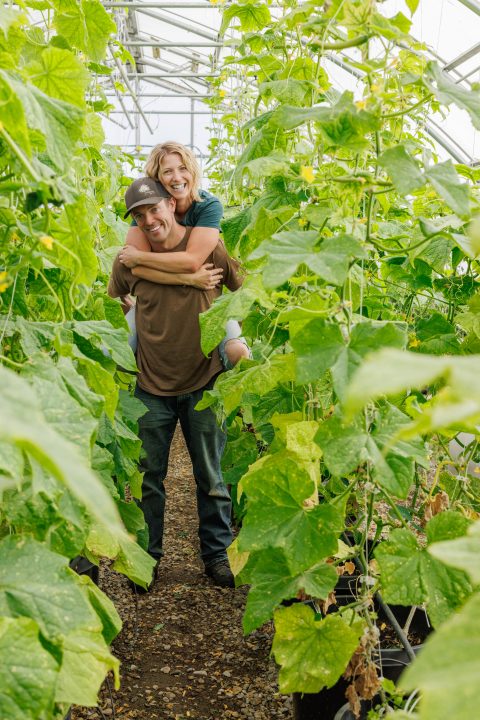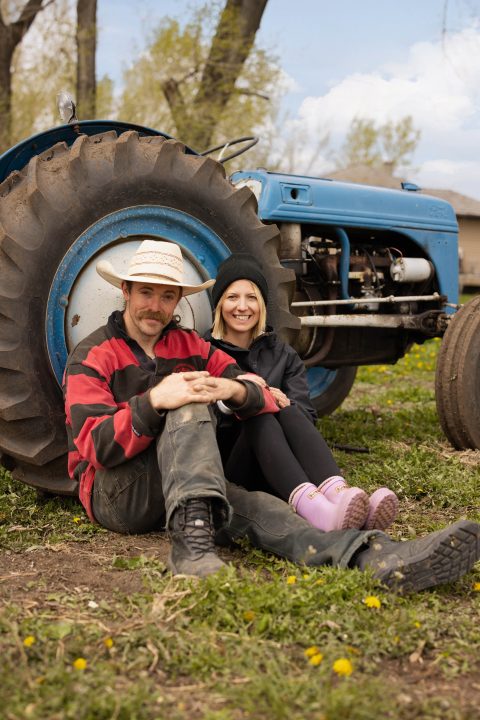Young Agrarians is celebrating the eleventh year of the Business Mentorship Network (BMN) program in BC and the third year of the program in the Prairies! The BMN offers farm business mentorship to a diverse array of new and young farmers. The mentorship is offered over the course of a year. Through one-on-one mentorship, peer networks and online workshops new farmers develop the skills necessary to operate ecologically sustainable and financially viable farm businesses.
Mentee applications for the 2024/2025 program close October 31st.
Mentees Apply here!
Mentor applications (paid position) are accepted year-round.
Mentors Apply here!
Check out the Business Mentorship Network page for more information!
Check out one Mentee’s story below and how the BMN made a contribution to the success of their farm. Want more? Head over to our BMN Blog for more mentorship stories.
Meet a Mentee: Kim and Sheldon of Mosaic Farms
We are Sheldon and Kim and our farm is called Mosaic Farms. We live in Mountain View
County, Alberta (40min from Calgary, AB). Our land is occupied on Tsuut’nia Nation.
Mike from Steel Pony Farm was our mentor this season.
What were your goals for this season and what did you do to try to achieve them?
Our goals for this season were to increase revenue and our marketing strategies,
integrate better organisation, time management and crop planning, and to implement
better harvest/packing systems.
Did you meet your goals / did it work out? What went well this season relating to your goals? What didn’t go as you expected and what did you do instead?
Yes, we achieved some of our goals this season. Our mentor, Mike, offered valuable
suggestions that helped us make progress. We reallocated some of our finances to
invest in the business, including purchasing an ATCO trailer, which we converted into
a cooler for storing and packaging our harvested veggies before delivery. While we’re
pleased with this improvement, we aim to enhance the organization inside the trailer
for even greater efficiency.
Mike also shared a Google Sheet to assist with our crop planning, which helped us
stay on track with succession planting and managing quantities. However, we did
struggle to maintain that schedule throughout the season, so we’ll focus on
improving this aspect moving forward.
In terms of marketing, we dedicated more effort to sharing our family story and
day-to-day activities on the farm through Instagram, including moments like
harvesting with the kids. We also engaged our community on Facebook to gauge
interest in canning produce and created a waitlist. Additionally, we discussed starting
a newsletter with our clients, and the feedback has been overwhelmingly positive,
encouraging us to move forward with that idea.
What resources did you find most valuable to support your business during the season?
The Crop Planning Worksheet we received from Mike.
What were your best sales channels/avenues?
Facebook Marketing, Facebook Community Page, and word of mouth.
Why do your customers buy from you? What was the best piece of feedback or praise you got from a customer?
Our customers choose us because of the unique value we offer in terms of quality
and variety. This season, the best feedback we received highlighted their appreciation
for our expanded selection and the improved quality and quantity of our produce.
Repeat customers particularly noted the new items we introduced compared to
previous years, as well as enhancements in size for vegetables like celery, bell
peppers, strawberries, and an increase in our lettuce offerings.

What was the most important thing you gained from the YA Business Mentorship Network Program experience?
The most important takeaway from the YA Business Mentorship Network Program
was gaining Mike as a valued friend and colleague. We also acquired valuable
knowledge on bookkeeping and accounting through the webinars and Zoom
meetings, which will significantly enhance our skills in that area.
What specific business skills did the mentorship help you develop?
Organization, perspective and structure.
How has participating in the BMN program equipped you to adapt to environmental or economic challenges on your farm?
It reinforced the organic practices we already implemented on the farm.
What part of the mentorship experience made you feel most empowered as a new farmer?
The mentorship experience that empowered me most as a new farmer was connecting
with a community of both experienced and novice farmers. This sense of belonging
allowed us to engage in meaningful conversations, exchange ideas, and discuss
challenges with like-minded individuals who share similar interests, values, and
goals.
In what ways did the BMN program help you refine or reshape the long-term direction of your farm? What will you do differently next year?
The most valuable piece of advice my mentor gave me is to identify challenges and
explore unique ways to address them. For instance, when we couldn’t afford a
commercial cooler, Mike and ourselves brainstormed alternatives and decided to
purchase an ATCO trailer that fit our budget. We then transformed it into a cooler by
adding an AC unit, which proved to be a great solution.
What were one or two big, hard lessons this season you would want to share with other farmers?
One important lesson I’d like to share with other farmers is to avoid the mindset that
your products need to resemble what you see in grocery stores. Embrace the
uniqueness of what you grow and find comfort in it. It’s vital to connect with your
clients about what they value most in their vegetables and to share information about
our organic practices. Educating them on why some veggies may not be perfectly
formed can help them appreciate our offerings even more.
Another hard lesson we learned this season is that losing structure in our succession
planting can hinder the variety we desire. Maintaining that structure is essential for
achieving a more successful outcome.

What were one or two victories, small or large, that you had this season?
We had a couple of significant victories this season, even amidst some setbacks.
Although we lost our onions to weeds, we turned that into a learning opportunity.
Instead of just cleaning up the bed, we decided to harvest the undeveloped bulbs and use them as onion starts. We cleaned, cured, and stored them for spring, allowing us
to recover some costs for next year.
Additionally, we saw a substantial increase in our garlic seed production. We started
with 600 cloves and have nearly tripled that to almost 2,000 cloves. Lastly, we planted
canna seeds for our bedding plants, nurturing them throughout the season to develop
strong bulbs. By drying and curing these, we’ll be able to avoid starting from seed
next year, ensuring we have healthier bulbs without the need to purchase new plant
material.
Share a story of something interesting/ funny/weird that happened on your farm this season.
This season, we had Mike and his family visit our farm in the spring. Mike mentioned
he always saves a lot of cardboard and had some with him in the truck. As Sheldon
and Mike conversed ideas of ways to use the cardboard in the garden, Sheldon
decided to bring out his wood chipper attachment for the tractor. Like two kids, Mike
and Sheldon began “playing” with the chipper, experimenting with the cardboard to
see how it would break down and whether it could be used as mulch. It turned into a
fun and memorable moment!
What are you most looking forward to this winter?
We are looking forward to a bit of a break relaxing, as well as to start crop planning
with the new skills we developed for the next season!
Where can we find you online?
www.mosaicfarmsltd.com website
Facebook : Mosaic Farms
Instagram : MosaicFarms


 Filter by Popular Categories
Filter by Popular Categories